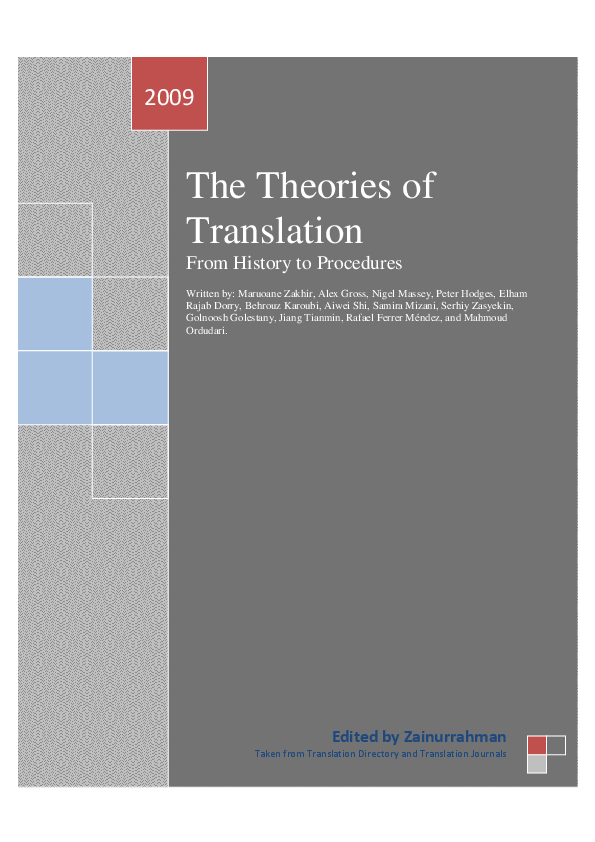consultant expert dr mohamed taha The Theories of Translation From History to Procedures
On Sale
$0.00
$5.99
consultant expert dr mohamed taha
The Theories of
Translation
From History to Procedures
Abstract
The case for Hermes as the god of translators and interpreters is a clear and compelling
one. While some European translators have campaigned for St. Jerome as the patron saint of
translation, there are probably some good reasons, with all due respect to the translator of the
Vulgate, for having a god of translation rather than a saint. First of all, in global terms Asians and
others outside of Europe are more likely to respond to ancient Greek traditions than to Christian
ones (as they do when they attend the Olympic Games), since similar "gods-of-the-road" are
revered in Japanese, Chinese, and even Mayan culture. Furthermore, the circumstances
surrounding the "divinity" of Hermes may open the way to some surprising new insights into
translation history and broaden the scope of Translation Studies as a whole. Hermes was par
excellence the god of interpreting, of quick-wittedness, of wily improvisation, and translation, like
writing itself, was a later development. Several current schools of Linguistics have their grounding
in ancient Greek works on grammar, but as we shall see, the Greeks themselves, following Plato,
looked to two authorities where language was concerned: grammarians and interpreters. While
grammarians have until recently rooted their quest for rules and their sometimes dubious claims
of universality in the structure of a single language, interpreters have necessarily always been
concerned with at least two or more languages and the frequently jagged interface between them.
And as will be explained, the tale of Hermes can also open up unexpected vistas onto the
prehistory of interpreting, an area usually regarded as beyond our study, and perhaps even help to
unravel the mystery of the origins of language itself.
It should be added that Hermes of course also acted as divine messenger, presided over
commerce and travel (both clearly linked to translation), and was the tutelary god of all the arts
and crafts, including magic and matrimonial match-making. We may perhaps forgive him if he was
also the god of thieves and deceit, since this function may spring somewhat naturally from some
of his other attributes.
الخبير الاستشاري د محمد طه
نظريات
ترجمة
من التاريخ إلى الإجراءات
الملخص
إن حجة هرمس كإله للمترجمين الفوريين واضحة ومقنعة
واحد. بينما قام بعض المترجمين الأوروبيين بحملة من أجل القديس جيروم باعتباره شفيعًا لـ
الترجمة ، ربما تكون هناك بعض الأسباب الوجيهة ، مع كل الاحترام الواجب لمترجم
فولجيت ، لإله الترجمة بدلاً من كونه قديسًا. بادئ ذي بدء ، من الناحية العالمية الآسيويين و
من المرجح أن يستجيب الآخرون خارج أوروبا للتقاليد اليونانية القديمة أكثر من المسيحيين
(كما يفعلون عندما يحضرون الألعاب الأولمبية) ، لأن "آلهة الطريق" هم
محترمة في الثقافة اليابانية والصينية وحتى ثقافة المايا. علاوة على ذلك ، الظروف
قد تفتح إحاطة "ألوهية" هيرميس الطريق أمام بعض الرؤى الجديدة المدهشة
تاريخ الترجمة وتوسيع نطاق دراسات الترجمة ككل. كان هيرميس على قدم المساواة
الامتياز إله التفسير ، وسرعة الفطنة ، والارتجال الماكر ، والترجمة ، مثل
الكتابة نفسها ، كانت تطورًا لاحقًا. العديد من مدارس اللغويات الحالية لها أسسها
في اليونانية القديمة يعمل على القواعد ، ولكن كما سنرى ، فإن الإغريق أنفسهم ، بعد أفلاطون ،
نظرت إلى سلطتين فيما يتعلق باللغة: النحاة والمترجمين الفوريين. في حين
حتى وقت قريب ، عمل النحويون على تجذير بحثهم عن القواعد وادعاءاتهم المشكوك فيها في بعض الأحيان
العالمية في بنية لغة واحدة ، كان المترجمون دائمًا كذلك
يهتم بلغتين على الأقل أو أكثر والواجهة المتداخلة بينهما بشكل متكرر.
وكما سيتم توضيحه ، يمكن لقصة هيرميس أيضًا أن تفتح آفاقًا غير متوقعة على
ما قبل التاريخ في الترجمة الشفهية ، وهو مجال يُنظر إليه عادةً على أنه خارج نطاق دراستنا ، وربما يساعد في ذلك
كشف سر أصول اللغة نفسها.
يجب أن نضيف أن هرمس بالطبع عمل أيضًا كرسول إلهي ، ترأس
التجارة والسفر (كلاهما مرتبطان بشكل واضح بالترجمة) ، وكان الإله الوصائي لجميع الفنون
والحرف ، بما في ذلك التوفيق بين السحر والزواج. ربما نسامحه إذا كان كذلك
أيضا إله اللصوص والخداع ، لأن هذه الوظيفة قد تنبع بشكل طبيعي إلى حد ما من البعض
من صفاته الأخرى.
The Theories of
Translation
From History to Procedures
Abstract
The case for Hermes as the god of translators and interpreters is a clear and compelling
one. While some European translators have campaigned for St. Jerome as the patron saint of
translation, there are probably some good reasons, with all due respect to the translator of the
Vulgate, for having a god of translation rather than a saint. First of all, in global terms Asians and
others outside of Europe are more likely to respond to ancient Greek traditions than to Christian
ones (as they do when they attend the Olympic Games), since similar "gods-of-the-road" are
revered in Japanese, Chinese, and even Mayan culture. Furthermore, the circumstances
surrounding the "divinity" of Hermes may open the way to some surprising new insights into
translation history and broaden the scope of Translation Studies as a whole. Hermes was par
excellence the god of interpreting, of quick-wittedness, of wily improvisation, and translation, like
writing itself, was a later development. Several current schools of Linguistics have their grounding
in ancient Greek works on grammar, but as we shall see, the Greeks themselves, following Plato,
looked to two authorities where language was concerned: grammarians and interpreters. While
grammarians have until recently rooted their quest for rules and their sometimes dubious claims
of universality in the structure of a single language, interpreters have necessarily always been
concerned with at least two or more languages and the frequently jagged interface between them.
And as will be explained, the tale of Hermes can also open up unexpected vistas onto the
prehistory of interpreting, an area usually regarded as beyond our study, and perhaps even help to
unravel the mystery of the origins of language itself.
It should be added that Hermes of course also acted as divine messenger, presided over
commerce and travel (both clearly linked to translation), and was the tutelary god of all the arts
and crafts, including magic and matrimonial match-making. We may perhaps forgive him if he was
also the god of thieves and deceit, since this function may spring somewhat naturally from some
of his other attributes.
الخبير الاستشاري د محمد طه
نظريات
ترجمة
من التاريخ إلى الإجراءات
الملخص
إن حجة هرمس كإله للمترجمين الفوريين واضحة ومقنعة
واحد. بينما قام بعض المترجمين الأوروبيين بحملة من أجل القديس جيروم باعتباره شفيعًا لـ
الترجمة ، ربما تكون هناك بعض الأسباب الوجيهة ، مع كل الاحترام الواجب لمترجم
فولجيت ، لإله الترجمة بدلاً من كونه قديسًا. بادئ ذي بدء ، من الناحية العالمية الآسيويين و
من المرجح أن يستجيب الآخرون خارج أوروبا للتقاليد اليونانية القديمة أكثر من المسيحيين
(كما يفعلون عندما يحضرون الألعاب الأولمبية) ، لأن "آلهة الطريق" هم
محترمة في الثقافة اليابانية والصينية وحتى ثقافة المايا. علاوة على ذلك ، الظروف
قد تفتح إحاطة "ألوهية" هيرميس الطريق أمام بعض الرؤى الجديدة المدهشة
تاريخ الترجمة وتوسيع نطاق دراسات الترجمة ككل. كان هيرميس على قدم المساواة
الامتياز إله التفسير ، وسرعة الفطنة ، والارتجال الماكر ، والترجمة ، مثل
الكتابة نفسها ، كانت تطورًا لاحقًا. العديد من مدارس اللغويات الحالية لها أسسها
في اليونانية القديمة يعمل على القواعد ، ولكن كما سنرى ، فإن الإغريق أنفسهم ، بعد أفلاطون ،
نظرت إلى سلطتين فيما يتعلق باللغة: النحاة والمترجمين الفوريين. في حين
حتى وقت قريب ، عمل النحويون على تجذير بحثهم عن القواعد وادعاءاتهم المشكوك فيها في بعض الأحيان
العالمية في بنية لغة واحدة ، كان المترجمون دائمًا كذلك
يهتم بلغتين على الأقل أو أكثر والواجهة المتداخلة بينهما بشكل متكرر.
وكما سيتم توضيحه ، يمكن لقصة هيرميس أيضًا أن تفتح آفاقًا غير متوقعة على
ما قبل التاريخ في الترجمة الشفهية ، وهو مجال يُنظر إليه عادةً على أنه خارج نطاق دراستنا ، وربما يساعد في ذلك
كشف سر أصول اللغة نفسها.
يجب أن نضيف أن هرمس بالطبع عمل أيضًا كرسول إلهي ، ترأس
التجارة والسفر (كلاهما مرتبطان بشكل واضح بالترجمة) ، وكان الإله الوصائي لجميع الفنون
والحرف ، بما في ذلك التوفيق بين السحر والزواج. ربما نسامحه إذا كان كذلك
أيضا إله اللصوص والخداع ، لأن هذه الوظيفة قد تنبع بشكل طبيعي إلى حد ما من البعض
من صفاته الأخرى.




